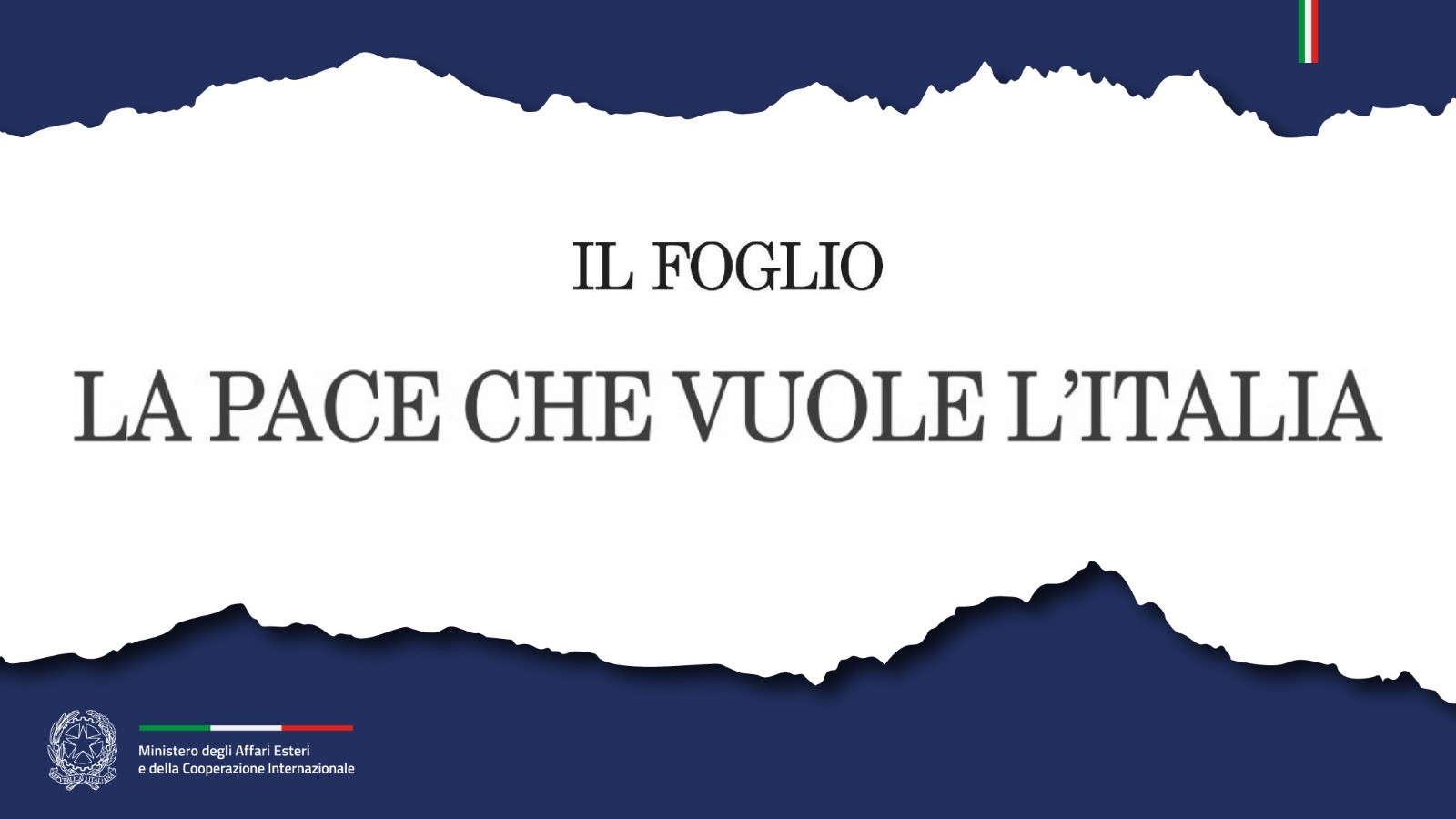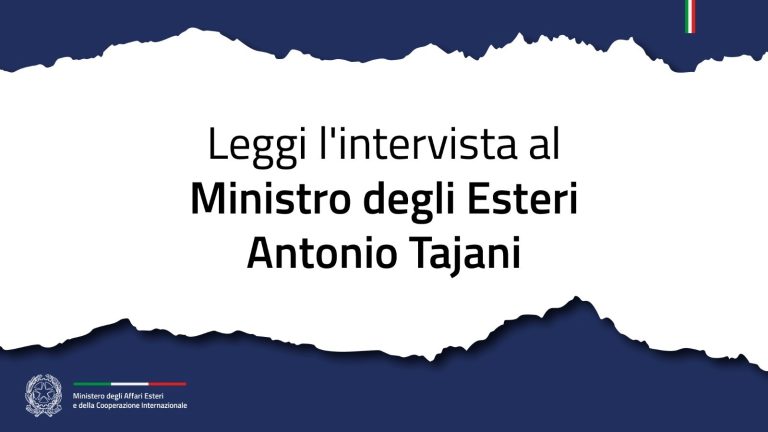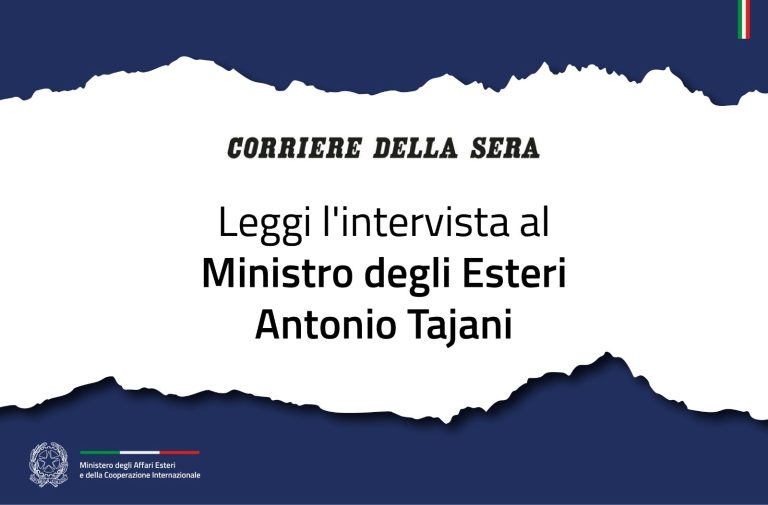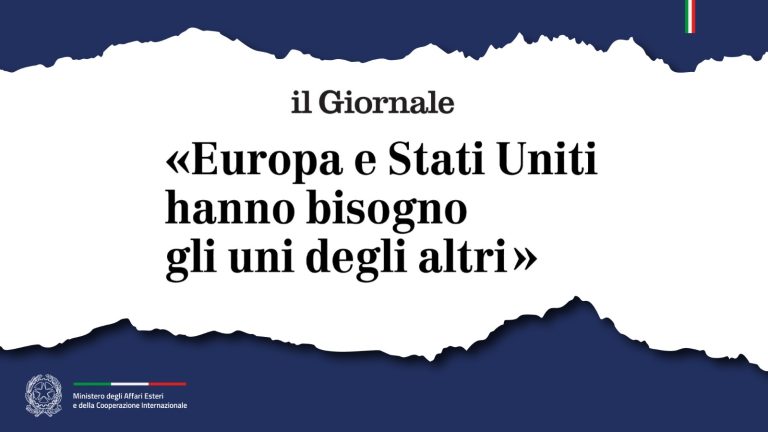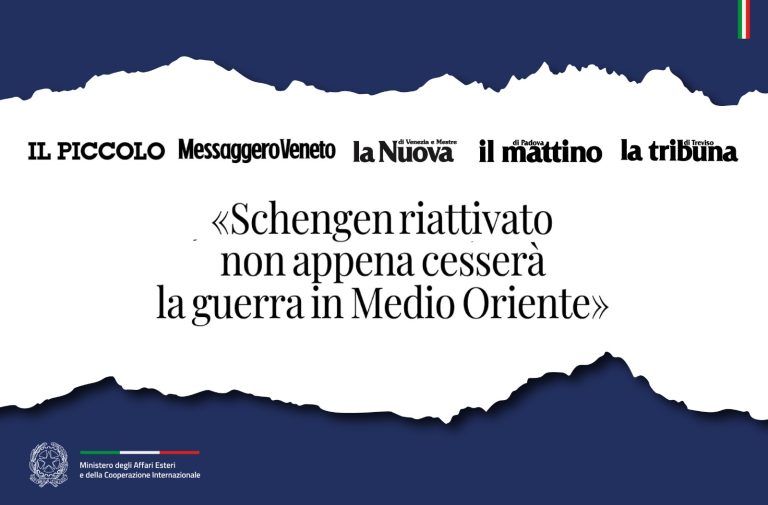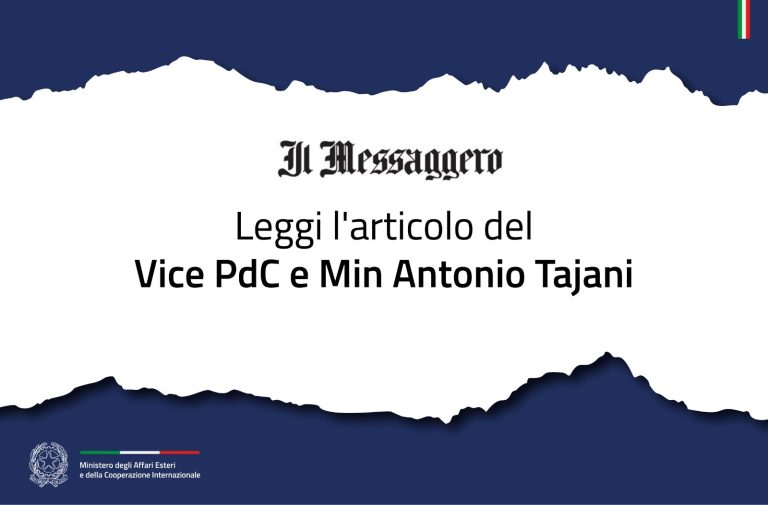Below is the text of the interview with Italian Minister of Foreign Affairs Antonio Tajani which took place last Saturday in Florence during the Optimism Festival organised by Il Foglio in the Salone dei Cinquecento in Palazzo Vecchio.
Good morning, Minister Tajani. I would like to start with the topic of the day, Lebanon and the crisis in the Middle East. What is happening, especially at the diplomatic level? Why did you say today (last Saturday, Ed.) that Crosetto’s words were nothing more than an outburst? Is something changing between Italy and Israel on the diplomatic level?
“We want to know what happened from Israel, whether it was a political choice or a choice taken by soldiers who are on the ground,’ replied the Minister of Foreign Affairs. We have stated in no uncertain terms that what happened is unacceptable, because Italian soldiers are not Hezbollah terrorists, Italian soldiers are there to bring peace. They are soldiers from a country that is a friend of Israel. This is why our reaction was very firm, and now we are waiting for the outcome of the investigation. The fact that the Israeli Government chose to open an investigation into the attack on the Italian base, on the Unifil base, is positive: we will see what happens. We are constantly talking to the Israeli Government; I have also complained to President Herzog. We had been asking for weeks and weeks for a guarantee for our military personnel. We were always given full attention and assurance that our troops would never be attacked. What has happened? Who is responsible? For sure, Unifil has been hit too many times, and two of the people wounded were certainly not Italians. We will see the outcome of the investigation; the messages arriving from the Embassy and the Government are reassuring, but words must be supported by deeds. We will continue to insist on knowing the truth and above all we want to reiterate that Italian soldiers are not to be harmed”.
We are facing two conflicts running almost in parallel. In recent days, Putin has met the President of Iran. Ukrainian President Zelensky has been in Rome. We have the impression that the Italian Government’s perspective is also changing: there is full support for Ukraine and yet the idea of a compromise, the idea of pushing for a compromise, seems to be gaining ground. Could the Italian Government really support a peace proposal from the Brics, from the countries with China and Russia, a peace conference like the one proposed?
“We have never said that. We are friends of Ukraine, we support it politically, financially, economically, and militarily. Having said that, we do not want an all-out war. We are working to achieve a just peace. However, working for peace, a just peace, that is, one that guarantees the independence and integrity of Ukraine, does not mean that we will not continue to help Ukraine. We have done so. Our parliament is about to approve additional funding for the reconstruction of Ukraine’s hydrogeological network before the arrival of winter, for Russia cannot break Ukraine with the cold. Our position has always been the same. We are consistent. Talking about peace does not mean changing positions. We all want peace. It would be illogical not to. We must always leave the door to diplomacy open. We are not warmongers. We want the war in Ukraine and the one in the Middle East to end, we want a ceasefire in Lebanon and a ceasefire in Gaza to create a Palestinian state that recognises Israel and is recognised by Israel. We have never changed our position. We have always stood firm on what was said at the beginning and we will continue to say the same thing. We are very consistent. But speaking for peace does not mean asking Ukraine to surrender. It is something quite different. We do not share the Brics’ position. We share the G7’s position. The position of the European Union is not the position of the Brics. The fact that we should hold a peace conference with both China and Russia present seems reasonable to me, as China may be the best equipped to persuade Russia to come to its senses. It is also in China’s interest to bring about stability, given that Chinese expansionism is not linked to military aspects but mainly to commercial ones. Then there is the issue of Iran, which is a different matter. We have strongly condemned Iran because it supplies arms to the Russian Federation. The G7 made a very harsh statement. We condemned it, just as we condemned the attack on Israel. But talking about peace does not mean surrendering or siding with a different side from the one we have always taken. We remain where we stand. With great consistency on everyone’s part, on the part of the Prime Minister, on my part, on the part of the Minister of Defence, on the part of the entire Government”.
Of course. You have mentioned three of the four global actors considered by America as the main adversaries of the West, of the world order as we know it: Russia, China, Iran and North Korea. With regard to relations with China, the current Italian Government has taken the important decision to withdraw from the Silk Road. Yet at the same time there are strong trade ties and you, as a representative of trade diplomacy, often talk with the Chinese Trade Minister. Still, we know that China’s geopolitical positions are very different from ours and we are well aware that the country uses trade diplomacy as a coercive weapon. What is Italy’s stance on this? Do you have any instruments to limit China’s power?
“We are more coherent than anyone else because Italy has been very consistent on the issue of tariffs and Chinese cars. We have supported the position of the European Commission, which not all EU countries have done. We left the Silk Road because we do not believe in that political project, but that does not mean that we should not have diplomatic and trade relations with China, which is a great country, and a great market. Everyone has talks with China, I don’t see why Italy shouldn’t. Sharing certain choices made by China regarding international policy is quite another thing, but having a trade dialogue with China seems right to me because we also have our own interests. That said, we believe in the principle of reciprocity, the level playing field: it means that the rules existing in China for our companies must be the same for Chinese companies operating in Europe. We have used the golden share when it was needed, so we are prudent, but we are nonetheless acting in Italy’s interests, because exports represent 40 per cent of our gross domestic product. The Chinese market is an interesting market, so we maintain relations based on the agreement signed in 2004 by Berlusconi”.
With regard to China, Russia and Iran, another big issue still unresolved is that of human rights, which nowadays is always somewhat sidelined in the face of diplomatic ties that must be preserved.
“It is not a forgotten issue: we have summoned the Ambassador of Iran because of what was happening in Iran, we have always fought to defend the rights of women and young people in that country, we have always said so and reiterated it. Likewise, we have always said to the Russian Federation that rights must be respected; I also said this when I was president of the European Parliament, and we continued repeating it following the deaths of important representatives of the Russian opposition. On this issue we do not take lessons from anyone because we have always been consistent and we have always said what we think. Having said that, having trade relations with China does not mean sharing its international policy; however, as you are well aware, we have interests to protect, there are many companies working there, and dialogue is always important in diplomacy. Dialogue does not mean sharing the positions of others: I do not share what Israel did with Unifil, I strongly condemned what happened, but this is not a reason to stop talking to Israel”.
One of the key factors driving pro-Putinism in Italy is the loud voice of those who somehow demand the surrender of Ukraine and a peace proposal with a Moscow perspective, which happens to be the same as that of China. Isn’t disinformation still considered a problem for national security?
“ Actually, in this regard, I signed an agreement with the United States during the G7 Foreign Ministers’ Meeting in Capri. I signed a document, an agreement with the United States of America on combating disinformation, so we are fully committed on this front; we have always said it, we have repeated it in all fora, so we are absolutely at the forefront on this issue”.
Using what instruments?
“ Using information, control, and monitoring tools: with the work done by our intelligence, by the postal police, by the institutions working in this direction on cyber security, which is one of the fundamental points of government action. My ministry has set up a unit that deals precisely with cyber security and also with artificial intelligence, which as you know is also used for disinformation. We are working on this, we are at the forefront, in line with our G7 allies”.
Speaking of the G7, there has been a loud call in recent months for a boycott of Israel in universities. At the same time, the G7 has of course condemned this kind of boycott, but there are some countries that also exploit academic and scientific diplomacy to steal information and do espionage intelligence on scientific institutions. What is your view on this? Should we adopt a higher level of security to protect ourselves and our research?
“Yes absolutely. Italy is already working on this, we are all committed to securing our data. Attacks on data are normal, they have always occurred and will continue to occur: industrial espionage exists, but our intelligence, which is particularly efficient, is at work. Obviously, we must always improve, we must always be up to the times, but certainly we are not falling behind.”
Back in Italy, Minister Giorgetti said that sacrifices must be made with the manoeuvre. How do you feel about that? I mean, using the word ‘sacrifices’ at a time like this…
“I believe that Giorgetti’s words have been misinterpreted. No new taxes are being considered, also because we are in government, we of Forza Italia; to increase the tax burden with us in the government is impossible. It is important to understand that when we talk about Superbonus and property tax, we are talking about respecting the law, that is, having ghost properties registered, which means combating tax evasion, because it is not fair that those who own their homes should pay the Imu tax while those who own unregistered homes do not; therefore, it is necessary that everyone pays in order to pay less. And this is an operation for recovering what is due according to the law, as it is right and as it is provided for by law. If you do renovations that change the value of a property – even if done under the Superbonus 110% – if you merge properties, increase their volume, etcetera, it is fair, it is your duty to inform the Land Registry. Thus, you will pay a higher Imu tax because the level of your property changes; but no new property tax will be introduced because we are absolutely against it. We didn’t talk about it, we only talked about bringing more money into the state coffers by targeting the underground economy. This is a part of the fight against tax evasion that must be conducted in a very firm manner because the fight against evasion brings money into the state coffers, which means in turn that raising taxes on citizens will not be necessary”.
However, asking more from banks seems to be a bit of a taboo at the moment.
“We are against asking a sector for more. I believe that, as happened before, the Government should meet with the banks to discuss possible forms of collaboration. An agreement must be found; however, we must be careful, because we must also respect the Constitution: there cannot be regulations having retroactive effects on a sector, so taxing something belonging to the past is against the Constitution, as confirmed by the Constitutional Court itself. So, I am against it, and we were also against trying to put a tax on extra-profits… except that the word extra-profits sounds very Soviet Union to me, because who decides what is the level of profit and what is the level of extra-profits? Profits are profits in a social market economy, in which I believe; profits must be made available, in the sense that they must be used for the economic growth of the country. So, banks must continue to lend money to businesses and citizens, because that is their job, and to collect savings. Fortunately, we have a healthy banking system, much healthier than those of other EU countries, and I say this having no interest, nor even a large bank account”.
Let’s hope no one checked it out as happened to others in recent days…
“What happened is outrageous. There are too many espionage actions, too many attempts to check our data. Our society cannot allow such things to happen. This is another reason why we have reduced the maximum limit for interceptions for non-serious crimes. It is obvious that when it comes to fighting the Mafia or the Camorra, it’s a different matter. Wiretapping must be used to find evidence against persons under investigation, it must not be used for other purposes. I believe that in a democratic country this should be a normal thing. Unfortunately, this was not a normal thing in Italy, which is why, fortunately, the regulation bearing the name of our senator Zanettin was approved”.
Minister Giorgetti will be here soon, is there anything you would like to remind him not to put in the manoeuvre, a reminder?
“No, we are in perfect agreement. I have had two great masters: one was Indro Montanelli, the other Silvio Berlusconi. I learnt a rule from Berlusconi: the goal is to achieve a growth that improves the well-being of our citizens; if you want to grow, you do not have to raise taxes. The recipe is less taxes, less taxes. There are no other rules to encourage economic growth in our country, which is a country with four million small and medium-sized enterprises”.
One last question, the same question Kamala Harris was asked a few days ago. Who is the biggest opponent…
“I’m not running for president of the United States, though…”.
No, by all means… who is Italy’s biggest opponent right now, apart from taxes?
“Italy’s greatest opponent at the moment is a series of negative coincidences. Certainly wars: I am thinking of the damage they do to international trade, and to Italy, which has become the world’s fourth largest trading power, with exports accounting for 40 per cent of GDP. Then there’s the cost of energy. Energy that costs so much – much more than it costs in Germany, much more than it costs in France, much more than it costs in Spain – it is lead on the wings of our exports. From a commodity point of view, our country is the largest exporter of products. Only China exports more than us. So, we are present in all sectors. But we struggle with the cost of energy. That is why we believe in the battle we are waging in favour of nuclear power, because that is the formula for making our system competitive. And at the same time, we have to convince all the countries of the European Union, even those who say they are pro-European in words, but who are really not, to create a single energy market, a way to make the entire European industrial system more competitive.”

